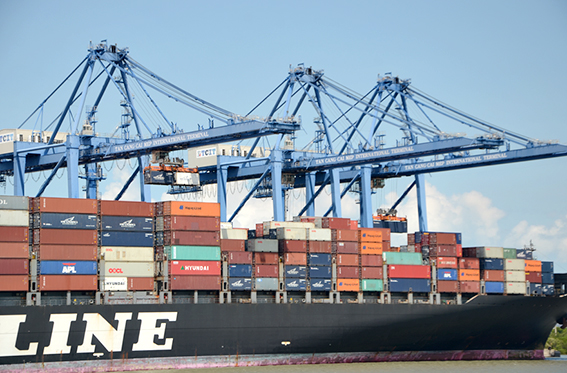Singapore logistics firms anticipate FTA opportunities
 |
Anthony Tay, general director of APL Logistics Vietnam, told VIR that Vietnam’s logistics industry will continue to see robust growth, increased level of service and competition in the near future.
Vietnam is well positioned to benefit from FTAs such as the Trans-Pacific Partnership (TPP) and continued investments to improve its land, ocean and air transport infrastructure. Its central location in Indochina and mainland Southeast Asia is also an opportunity to develop the reach and capability of multi-country logistics.
APL Logistics Vietnam is part of the Singapore-based APL Logistics group. The company first established operations in the country in 1995. Beginning with a modest 743 sq.m warehouse, the firm developed and grew its network and now operates nearly 60,000 sq.m of warehouse space across Vietnam.
In 2015, APL Logistics set up a 43,664 sq.m warehouse in Binh Duong for container-based exports and distribution services for retail and e-commerce. In the northern port city of Haiphong, the company has a 7,432 sq.m warehouse and has plans in the pipeline to double their capacity to serve customers in export manufacturing for apparel and footwear.
“Subject to our development work with the local regulatory authority, we have plans to expand our services to become an Indochina hub to cater to Southeast Asian cargo. We also have plans to make South Vietnam a multi-modal logistics hub alternative for Southeast Asia, to capture the ASEAN Economic Community (AEC) initiatives that Vietnam is a part of,” said Tay.
In the same vein, Chan Yoke Ping, head of Cambodia, Laos, Myanmar and Vietnam at YCH Group, told VIR that the upward growth trajectory of Vietnam’s logistics industry will present dynamic investment opportunities for Singaporean logistics firms.
The firm believes that the implementation of the AEC will function as a catalyst for stronger regional integration and reduction in bureaucratic red tape, thereby facilitating a greater presence of Singaporean logistics service providers in Vietnam.
Singapore is an important trade partner for Vietnam and has deepened investment and development ties over the years. This arms Singaporean logistics enterprises with a rich well of knowledge and expertise to tap.
“With a stronger understanding of the working culture, bureaucratic ecosystem and culture of Vietnam, logistics firms from Singapore will find it easier to penetrate the Vietnamese logistics industry and establish a strong presence in the country,” Yoke Ping said.
To meet rising logistics demand, YCH will scale its capacity by moving vertically into industries such as consumer electronics, pharmaceuticals and healthcare. The move is designed to ensure the firm develops an extensive supply chain model that is well-positioned to cater to a variety of industries’ logistical needs.
“Capacity will be scaled up by expanding geographically into regions to create an end-to-end supply chain model that is both efficient and cost-effective,” she said. “YCH has identified the Mekong Delta and geographical centre regions of Vietnam as key anchors for our supply chain model in Vietnam that will be a launchpad to serving our customers’ logistical requirements all across the country.”
Luong Anh Thoa, general director of Pan Asia Logistics Vietnam, is also upbeat about the industry’s prospects.
As many multinational companies import materials and intermediate goods to Vietnam to produce finished goods for export, Thoa believes the new FTAs will provide exceptional opportunities for multinationals and their domestic suppliers to boost investments.
“Being a Singaporean logistics company located in Vietnam, we are analysing the changes and developments closely in order to support our existing customer base and provide top notch customs brokerage services, international transportation and valued added services to our clients and attract new potential customers in and to Vietnam,” she said.
In the past six years, Pan Asia Logistics, headquartered in Singapore, has established offices in Ho Chi Minh City, Hanoi and Haiphong. Their turnover in 2014 was $195 million and increased to $248 million in 2015.
The logistics firm is planning to recruit and train more personnel, increase their sales force and develop more cross border business with a strong focus on Asian markets. Investing in warehouses and distribution centres in Vietnam will be a key strategy in the near future.
What the stars mean:
★ Poor ★ ★ Promising ★★★ Good ★★★★ Very good ★★★★★ Exceptional
Latest News
More News
- Kurz Vietnam expands Gia Lai factory (February 27, 2026 | 16:37)
- SK Innovation-led consortium wins $2.3 billion LNG project in Nghe An (February 25, 2026 | 07:56)
- THACO opens $70 million manufacturing complex in Danang (February 25, 2026 | 07:54)
- Phu Quoc International Airport expansion approved to meet rising demand (February 24, 2026 | 10:00)
- Bac Giang International Logistics Centre faces land clearance barrier (February 24, 2026 | 08:00)
- Bright prospects abound in European investment (February 19, 2026 | 20:27)
- Internal strengths attest to commitment to progress (February 19, 2026 | 20:13)
- Vietnam, New Zealand seek level-up in ties (February 19, 2026 | 18:06)
- Untapped potential in relations with Indonesia (February 19, 2026 | 17:56)
- German strengths match Vietnamese aspirations (February 19, 2026 | 17:40)
















 Mobile Version
Mobile Version